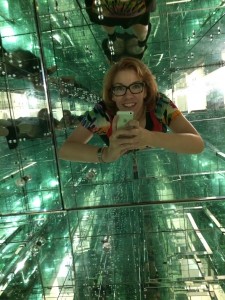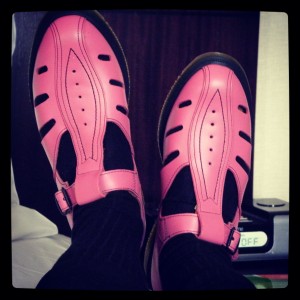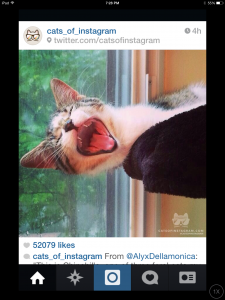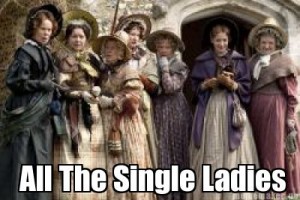 The first chapter books I read (and reread, endlessly), starting when I was five going on six, were a series of history books that had belonged to my mother, all written for red-blooded American girlz. They were biographies, many of them about the childhoods of various U.S. presidents’ wives. The practice of history in these books was not exactly rigorous. Even the non-FLOTUS women’s stories were whitewashed in a way that meant, for example, Jane Addams and Julia Ward Howe’s entire lives were covered in a hundred pages, with charming anecdotes, and without a single mention of the suffrage movement.
The first chapter books I read (and reread, endlessly), starting when I was five going on six, were a series of history books that had belonged to my mother, all written for red-blooded American girlz. They were biographies, many of them about the childhoods of various U.S. presidents’ wives. The practice of history in these books was not exactly rigorous. Even the non-FLOTUS women’s stories were whitewashed in a way that meant, for example, Jane Addams and Julia Ward Howe’s entire lives were covered in a hundred pages, with charming anecdotes, and without a single mention of the suffrage movement.
I know. Boggle boggle boggle, right?
These were been the books that gave me the typical view of a woman’s viable career options: saint/martyr/kindling, presidential spouse, cannon loader, author, native guide, or founder of such organizations as the Red Cross or the Girl Scouts. I also remember them as having happy endings all round, for Clara Barton and Louisa May Alcott and even for Sacagawea. Though not for Joan of Arc, unless your philosophical outlook can be best summed up as Too bad about the horrifically painful execution, honey, but you got to go to a coronation, and that had to be cool. Also: yay sainthood!
(Joan’s bio was from a different-but-related series; she was the one non-U.S. citizen in the batch).
When I initially launched the Heroine Question interviews, it didn’t occur to me for a second to question whether I should be using an ungendered noun, like hero or protagonist. Or woman protagonist. Honestly I’m a sucker for a good pun, and even more of a sucker for a bad one: I have an entire pinboard full of the things.
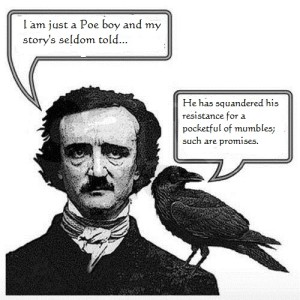
I spent twenty minutes of my life making this.
Basically I had a vision. And that vision was a series of posts entitled “Caitlin Sweet kicks Heroine!” and “Martha Wells on her Heroine Habit” and equally questionable clicky fodder.
When I reached out to that first raft of authors who’d be doing heroine here on my blog, I had a fair expectation, based on most of them being in my age cohort, or near that vicinity, and the fiction available to us when we all were kids, about some of the answers I’d get. I’d limited the field to written works or their authors–no TV, no movies, no frickin’ Lara Croft. I figured there’d be answers within the SF and fantasy realm: an essay on Lucy of Narnia fame, maybe Alice of Wonderland, or Meg Murry of A Wrinkle in Time . (That one’s coming.) Tiger Lily from Peter Pan. I also anticipated, correctly, that someone would mention Anne of Green Gables
. (That one’s coming.) Tiger Lily from Peter Pan. I also anticipated, correctly, that someone would mention Anne of Green Gables and Jo March from Little Women
and Jo March from Little Women .
.
I also thought we’d hear about Emma Woodhouse and Jane Eyre and Karana from Island of the Blue Dolphins and Scout Finch. And authors: Agatha Christie, Nelly Bly and Mary Shelly. (Erma Bombeck was a surprise, but a welcome one.)
and Scout Finch. And authors: Agatha Christie, Nelly Bly and Mary Shelly. (Erma Bombeck was a surprise, but a welcome one.)
I expected my interview subjects would sometimes be picking female characters from novels not generally considered to be genre fiction, in other words. Women who weren’t engaged in universe-saving or fleet-footed-adventuring or anything remotely approaching derring-do. It didn’t, when I was coming up with this particular series, even occur to me that heroine had to mean anything other than 1) showing up to carry a given literary work; 2) inspiring a young writer-to-be.
Much of this unquestioned assumption of mine grew from the fact that heroine was the catch-all term within the educational realm for girl characters. “The heroines of Jane Austen’s novels…” is a time-honored lit crit phrase meaning Lizzie, Emma, Ann, Fanny, Katherine and that drummer whose name I can never remember. “Lucy Maud Montgomery’s hot-tempered heroine…” has long been a valid mouthful of a way to refer to PEI’s favorite redhead. You know, when you’re afraid you’ve somehow used “Anne” one too many times in an English essay.
(Pro tip: Just say Anne again. The essay’s about her… it’s cool.)
Oddly, I think if you said “Jane Austen’s heroes are…”? The answer you’d get much of the time would be Darcy. Knightly. Brandon.
Is this good? Well, no. When one looks at it squarely, it’s even, perhaps, a little queasy-making. The above three dudes aren’t world-savers and they aren’t even the protagonists of the novels they’re in. So it’s sad that some might find it easier to credit Willoughby with heroism for plucking an injured Marianne off a hillside than to bracket Anne Elliot with Tomoe Gozen when the former insists upon visiting a broke and sick old school friend, against her family’s wishes.
when the former insists upon visiting a broke and sick old school friend, against her family’s wishes.
Does heroine still have a use, and does it lie solely within the realm of classic literature? Are there modern heroines who aren’t heroes? Should I rename this series “Girlhood heroes of …” or “Chicks we worshipped way back when…”
More importantly, if I do retitle, is there some way to get a faintly tasteless string of puns out of the deal? Extra points if you make me sorry I asked this.
 Total dental freeze,
Total dental freeze,


